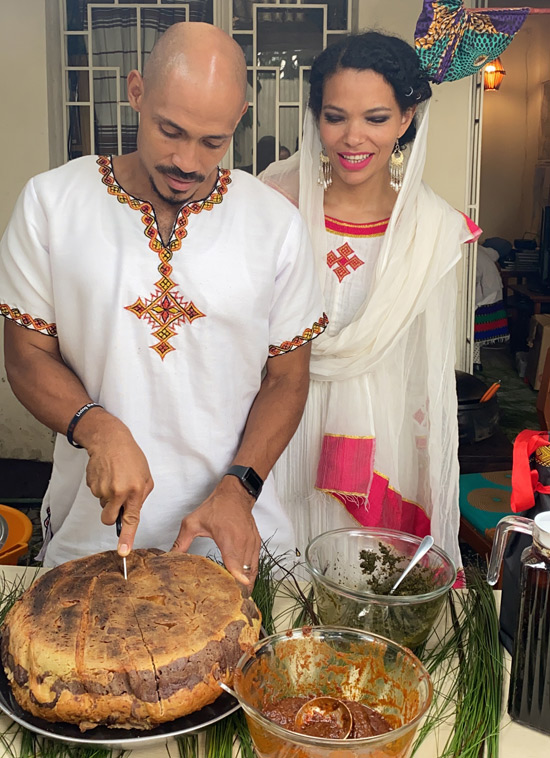Copyright © TMS Global
TMS Global
PO Box 936559
Atlanta, GA 31193-6559
800.478.8963
Our EIN number or Taxpayer Identification Number is 58-1546441.

What does 'moving into the neighborhood' really mean for cross-cultural witnesses?
In December we celebrate the Incarnation of Jesus Christ—that miraculous act in which God, while retaining His full deity, took on flesh and became fully human. In The Message, Eugene Peterson paraphrases John 1:14 to say, “The Word became flesh and blood, and moved into the neighborhood.” As we celebrate the Incarnation, we talked to a few cross-cultural witnesses (CCWs) about how they seek to imitate Jesus by “moving into the neighborhood.”
Laurie Drum is director of training and formation with TMS Global. She says one of the first things that cross-cultural witnesses learn in training is the importance of living and serving incarnationally. This means CCWs seek, like Jesus, to live among the people they serve, learning their language, customs, and worldview.
She says incarnational living and incarnational ministry are the same thing. “Your life is your work. You live out your calling.”
Drum seeks to live out her life and faith in a way that makes sense to the people around her. This may mean not having certain possessions if her neighbors don’t also have them. Or it might mean changing her schedule to fit in with local rhythms.
Living like their neighbors often requires CCWs to give up certain privileges. “It’s about becoming like,” Drum says. “Finding the common ground and saying, ‘I want to understand more about who you are, and then live life with you, alongside you.’”

|
TMS Global cross-cultural witnesses, Richard and Amanda Coleman, celebrate Easter in Ethiopia. Richard is cutting into difo dabo, a bread often served for special occasions. In Ethiopia, it is traditional for the man of the house to cut the bread. The couple is wearing clothing from the region. |
In Ethiopia, Richard, his wife, and five children seek to live like their neighbors. He says this often requires self-emptying. “Humbling yourself, emptying yourself of power, prestige, and resources, in order to, as best as possible, meet people where they are,” Richard says. “There will always be some kind of dynamic that makes it impossible for me to do that perfectly. But there are things that I can do,” he says.
One important thing is learning the language.
“Ethiopia is the only country in Africa that has its own alphabet,” Richard says. “If I don’t speak the language, it shows that I’m disrespecting this great legacy.”
It’s also important to eat the local food.
“There are a lot of foreigners that don’t eat injera,” Richard says. “Eating with people, eating from the same common plate, doing all those things challenges the notion that the 'wealthy Westerner' is unwilling to learn and appreciate these Ethiopian ways. So the more we do that, the more it endears us to the hearts of the people here.”
Richard says incarnational living doesn’t mean becoming a completely different person. He says when you live in a new place, you expand yourself, adding pieces to the collage of things that make up your identity.
“I’m the same Richard. I’ve just learned a different dance,” he says. “If Richard goes onto the dance floor, and does the tango, and then a new song comes on and he switches and does the salsa, is he a different dancer? Not at all. It’s just that I recognize that the rules and the beats have changed, and then I just adjust appropriately. It’s a dance, and the music changes, but the person doing the dancing doesn’t.”
Richard says he has to decide which pieces of himself work best in each situation.
He also has to decide if there are places in which he needs to be countercultural. For example, the ways he lives out his roles within his family are sometimes different than cultural norms.
“There are aspects of a culture that need to be confronted with the gospel. And you can’t cease living those out in order to fit in. You have to continue living those out, while at the same time being incarnational where you can.”
Richard says incarnational living is a constant process.
“When you stop pressing, that’s when you deprive yourself of the wonderful privilege and joy of fully identifying with these people as much as you can,” Richard says. “We’ve had people tell us things that they usually don’t tell other foreigners. People will let you into their deeper world. Not just the academic part, but the part where people will talk to you like you’re one of them.”
Richard was recently interviewed on our podcast, Thy Kingdom Pod.
| Tutoring teenagers in Southeast Asia allows Sam to build relationships with students and their families. (Stock photo) |
In Southeast Asia, Sam* has experienced his neighbors inviting him into their deeper world. “The conversations I get to be a part of, the community I get to have, it’s amazing,” Sam says. “People are awesome. I love the family that I have here.”
But he doesn’t always love what he does. He leads an education program, and he hates teaching.
“I don’t enjoy it. But there’s a need in the community. There are relationships that need me to behave in a certain way. And that’s what I’m doing,” Sam says. “And there’s kids that think they’re stupid that I’m going to teach that they’re not stupid. If I have to tutor them in English 50,000 hours, fine. They’re going to learn that they’re not stupid.”
He says learning to live incarnationally can be awkward and uncomfortable. For example, Sam says his air-conditioning is comfortable. Sitting in the sun on the side of the street in order to tutor teenagers? Not so much. But, he says, “If you want to love the people, you have to be with the people, and you have to actually love them. You can’t just tell them Jesus loves them, you have to go there and love them.”
But loving people can look different in every culture. For example, Sam says where he’s originally from, loving someone looks like being direct. But that’s not the case where he lives now. He says he’s had to learn a whole new set of social norms.
“You’re having to go against what you were actively taught growing up. And you have to learn how you solve problems like the new culture. How do you get out of an uncomfortable situation in your new culture? How do you stay out of trouble in your new culture? It’s really not fun. It’s really, really great in the end, and it’s got some beautiful moments along the process, but it’s not fun. It’s usually doing stuff people don’t want to do.”
Sam says incarnational living involves a lot of listening and learning.
“You have to earn your spot at the table, and then you have to wait until it’s your turn to talk.”
Sam says he’s never seen a shining light pointing him to the person he was supposed to teach. He just saw a need that he could fill. And even though it’s not always pretty or fun, “I love what I do,” Sam says. “It gives me so much life.”
Sam notes that incarnational ministry is hard to measure. It might feel like you’re wasting time, even though that’s not the case.

| Serving among a population in Ohio, Laura finds that a good way to build relationships with her neighbors is by having tea together. |
In the United States, in Ohio, Laura is learning to re-evaluate how she measures ministry.
“It’s so easy for me to think, ‘I’m in ministry, so now I need to see X number of people this week and have this quota sheet to make myself feel like I’m doing enough incarnational ministry.’ But I don’t think Jesus lived by a quota sheet.”
Laura resides in a neighborhood where many South Asian people live. She studies South Asian classical music and works a part-time job as a music teacher. When she’s not working or studying, she gets to know her neighbors. For Laura, living and serving incarnationally means being her authentic self. She says it’s important to not build fake friendships with people just because she wants them to know Jesus.
Building relationships isn’t always easy. Laura says baked goods help. She also tries to make intentional choices. For example, instead of always buying food at Walmart, she often shops at the South Asian grocery store in her neighborhood.
She also prays that she will cross paths with her neighbors.
“I pray that we’d be in the hallway at the same time, and that it would work out for us to do things together,” Laura says. “I believe I have the neighbors I have who are open to friendship because I’d been praying for them for six months before I moved here.”
Ministry doesn’t happen the way she wants it to every week. Laura says she thought deep relationships and spiritual conversations would happen more quickly.
“My mentor has been good at slowing me down and helping me realize that this is life,” Laura says. “This is the way God works. Ministry is different everywhere. It’s slower than I want it to be.”
Laura says she’s learning to live and serve at the pace of Jesus. This can be challenging, especially when her part-time jobs take up an entire day.
“I think, ‘but God I wanted to do more ministry today!’ Then I’m reminded, ‘well, my job is ministry too, because I’m in relationship with people when I’m working. Therefore, it is ministry.’”
Laura says that in CCW training, the facilitators taught her to focus on people, not projects.
Director of training and formation Laurie Drum says seeking to live an incarnational life causes you to re-evaluate how you measure things. “And you can’t measure by numbers,” she says. “Where have you seen the light crack through? The stories end up being the measurement, more so than the numbers. Where are you seeing light crack through?”
*Pseudonym is used for security reasons.